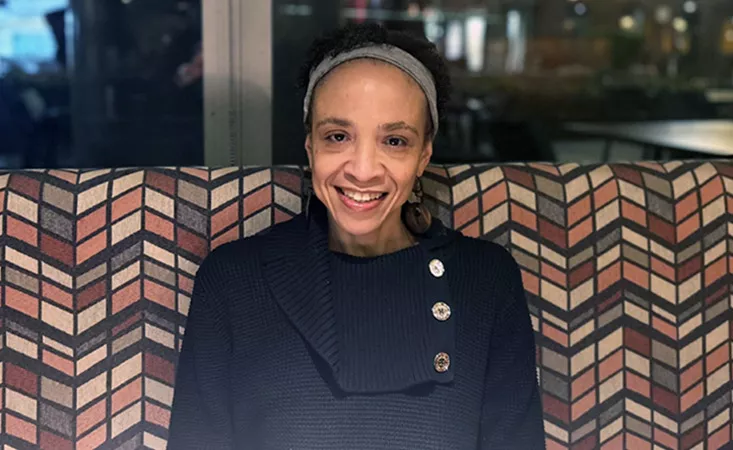
Pancreatic cancer survivor Tamara Holmes
Pancreatic cancer survivor Tamara Holmes turned to PanCAN’s Stories of Hope as she navigated her own journey. They showed her that she wasn’t alone and that there are other survivors out there. Now, she shares her experience to continue to give back to the community and help others facing this diagnosis.
I’ll never forget the night of December 29, 2020. After months of abdominal pain every time I ate, I went to an urgent care clinic desperate for an answer. When a doctor decided to do a CT scan to check my pancreas, I was stunned to hear her tell me the scan identified a lesion on my pancreas and they believed it was cancer. The thought that kept going through my mind that night: I’m only 48. Will I make it to see 49?
The biopsy was not definitive, yet the doctors felt certain that it was stage 3 pancreatic cancer. Whatever it was, it had not spread but it was situated over an artery. The plan was to use chemotherapy to hopefully shrink it off of the artery so I could have a Whipple surgery. The chemo shrunk it, but it didn’t shrink it enough. The chemo was followed up by radiation, but once again, it did not shrink off of the artery enough for my doctors to feel comfortable operating. The plan my doctors had for me at that point was simply to continue to take maintenance chemo, and when it spread, I might qualify for a clinical trial. In other words, there was nothing more they could do.
It was around this time that a Story of Hope I read on PanCAN’s website literally saved my life. A survivor was recounting his story, and like me, he had been told by his doctors that they could not operate unless they could shrink his tumor off of the artery. Just like in my case, the treatment did not shrink it enough. But this survivor did not stop there. He shared in his story how he had found a surgeon in another part of the country who would do the surgery. He traveled to that doctor, had the Whipple surgery and reclaimed his life.
Finding a Surgeon
After reading the fellow survivor’s story, I knew that I had to try to do the same thing. I researched until I found the Mayo Clinic, where depending on the situation they may be able to do Whipple surgeries even when an artery is involved. I called, made an appointment and flew there to see if they could help me.
Ultimately, they could – and did – help me. I had surgery on April 19, 2022, and the surgeon removed my entire pancreas, my spleen, my gallbladder and part of my stomach. No cancer was found when they did the pathology, and in my specific situation I did not have to undergo anymore treatment after surgery.
The aftermath of the surgery was extremely challenging as my body struggled to adapt to my newly reconfigured digestive system. I lost about 50 pounds and I spent a month in the hospital because my body wasn’t absorbing enough to give me the nutrients that I needed. I even had to have a feeding tube inserted in my body, which I kept for about nine months. However, over time, things got better. The feeding tube was removed and I began to get stronger.
That’s not to say that my life isn’t without challenges. Because I have no pancreas, I am now diabetic and dependent on insulin. For the rest of my life, I will need to take enzymes whenever I eat to help with the digestion that my pancreas used to do. I will always have to monitor my vitamin and electrolyte levels to make sure I’m getting the nutrition that I need. Without a spleen, I will always have to stay up to date on my vaccinations because my immune system is compromised. And I’m still working on gaining weight, which sometimes seems to be an elusive goal.
But I can live with all of that.
Today, I’m rebuilding my life. I’ve been flying out to Mayo Clinic every three months for surveillance. I celebrate each time the CT scan shows nothing. In April, it will be two years post-surgery and I will have surveillance every six months instead of three.
Lessons Learned
One of the biggest lessons I learned from this journey: Look for doctors and surgeons who are pancreatic cancer specialists, as they see patients with this type of cancer regularly. And never be afraid to seek a second opinion.
I also learned the importance of reading other survivors’ stories. The news about pancreatic cancer is so grim and it can be easy to assume there is no hope in the face of a pancreatic cancer diagnosis. However, finding that Story of Hope that day showed me that people do survive pancreatic cancer. I was also inspired to stay positive when a friend who is a surgeon told me, “There are people who survive this. Why can’t you?”
Interestingly, I was also on Facebook one day when I was going through treatment and I came across a post where cancer survivors were encouraging someone who had been newly diagnosed. Two women posted that they were pancreatic cancer survivors. I messaged them both on Facebook and communicated with them and they encouraged me. Again, it reinforced for me the idea that this could be survivable.
I hope my story can show someone that there are people who survive pancreatic cancer, so they shouldn’t give up.
I’m grateful for my medical team and I’m grateful to be alive. Not only did I make it to see 49, but I recently turned 51 and I am not just surviving, I’m thriving.
PanCAN recommends consulting with a pancreatic cancer specialist. PanCAN does not recommend or endorse any particular physician or institution mentioned in constituent stories and blog posts.





